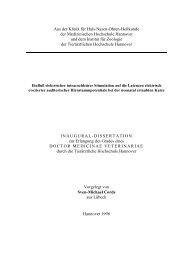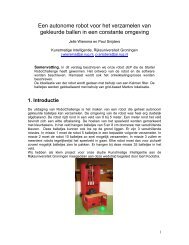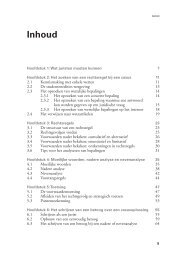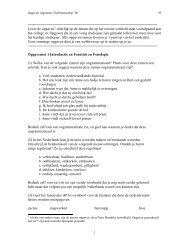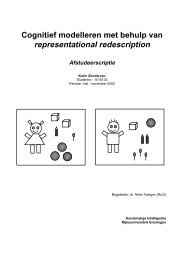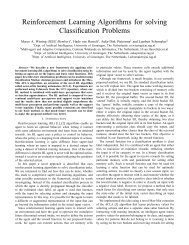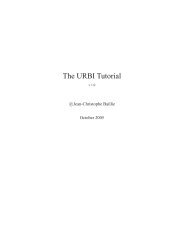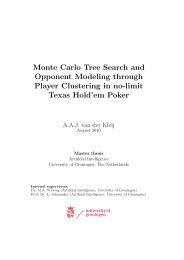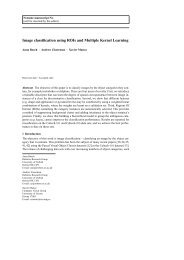Presuppositions in Spoken Discourse
Presuppositions in Spoken Discourse
Presuppositions in Spoken Discourse
Create successful ePaper yourself
Turn your PDF publications into a flip-book with our unique Google optimized e-Paper software.
Accommodation and Presupposition<br />
<strong>in</strong>terl<strong>in</strong>k<strong>in</strong>g is someth<strong>in</strong>g that is necessary for def<strong>in</strong>ite NP accommodation. In her<br />
analysis of <strong>in</strong>def<strong>in</strong>ite and def<strong>in</strong>ite NPs <strong>in</strong> file change semantics (FCS) she only<br />
allows def<strong>in</strong>ite NPs to contribute new file cards when they are able to be l<strong>in</strong>ked <strong>in</strong><br />
some way through their descriptive content with another file card.<br />
Interl<strong>in</strong>k<strong>in</strong>g is probably play<strong>in</strong>g a role <strong>in</strong> the accommodation of all triggers,<br />
and may <strong>in</strong> part be what makes accommodated <strong>in</strong>formation felicitous and<br />
understandable. We can see evidence of this <strong>in</strong> many of the examples of<br />
accommodated presuppositions <strong>in</strong> the corpus, for example the this college referred to<br />
<strong>in</strong> example (1) <strong>in</strong> this chapter, as well as for many others. The reader is encouraged<br />
to reexam<strong>in</strong>e the example of accommodation from this chapter. Most of them<br />
conta<strong>in</strong> a number of anaphoric an presuppositional expressions embedded with<strong>in</strong><br />
them, 18 e.g. Lawrence’s novels <strong>in</strong> example (3), this <strong>in</strong> (14), you language person <strong>in</strong> (15), he<br />
<strong>in</strong> (16), this <strong>in</strong> (17), and those cont<strong>in</strong>ued supply of funds <strong>in</strong> (18).<br />
The amount of l<strong>in</strong>k<strong>in</strong>g that will be possible will differ by trigger type.<br />
Triggers differ greatly <strong>in</strong> how much structure the presuppositions they <strong>in</strong>duce have,<br />
e.g. def<strong>in</strong>ite NPs have less structure than factives. Noun phrases are less likely to be<br />
complex and conta<strong>in</strong> variables, especially bound variables, or to show the type of<br />
<strong>in</strong>terl<strong>in</strong>k<strong>in</strong>g that abstract presuppositions can show. Big def<strong>in</strong>ite NPs are often big<br />
because they have additional arguments, sometimes entire restrictive relative<br />
clauses. The more structure a triggered presupposition has the more chance there<br />
will be that it is l<strong>in</strong>ked to the give discourse.<br />
In conclusion, neither van der Sandt and Zeevat’s nor Blutner’s account take<br />
the context <strong>in</strong>to consideration <strong>in</strong> the discussion of what licenses accommodation,<br />
and this means they are unable to expla<strong>in</strong> some cases. The potential to<br />
accommodate is to a certa<strong>in</strong> degree related to <strong>in</strong>herent features of the trigger<strong>in</strong>g<br />
expression, as <strong>in</strong> van der Sandt’s explanation, or to features of the potential<br />
alternatives to the trigger<strong>in</strong>g expression as <strong>in</strong> Blutner & Zeevat’s explanation. But<br />
the degree to which the presupposed <strong>in</strong>formation is l<strong>in</strong>ked to the context and the<br />
degree to which alternative <strong>in</strong>terpretations are excluded because of world<br />
knowledge or other pragmatic factors will also play a role how practical and how<br />
felicitous accommodation is.<br />
It still rema<strong>in</strong>s to be expla<strong>in</strong>ed how much l<strong>in</strong>k<strong>in</strong>g is enough, so this<br />
explanation suffers from the same problem as van der Sandt’s. I don’t have an<br />
answer to this, and I wonder if it is possible to even give one. In the end,<br />
accommodation is licensed when the result<strong>in</strong>g discourse is understandable, and this<br />
will vary not with a particular presupposition trigger or a particular presupposition,<br />
but with the context <strong>in</strong> which a particular presupposition is used. Because of this,<br />
the ability to accommodate easily or felicitously is not an absolute feature of certa<strong>in</strong><br />
triggers but only a tendency <strong>in</strong> trigger usage that can be overridden by contextual<br />
<strong>in</strong>formation and world knowledge. This means that it will be difficult to make more<br />
than general predictions about when the factors that <strong>in</strong>fluence the licens<strong>in</strong>g of<br />
accommodation will actually permit it.<br />
18 I am grateful to Rob van der Sandt for po<strong>in</strong>t<strong>in</strong>g out this pattern <strong>in</strong> my data.<br />
137



